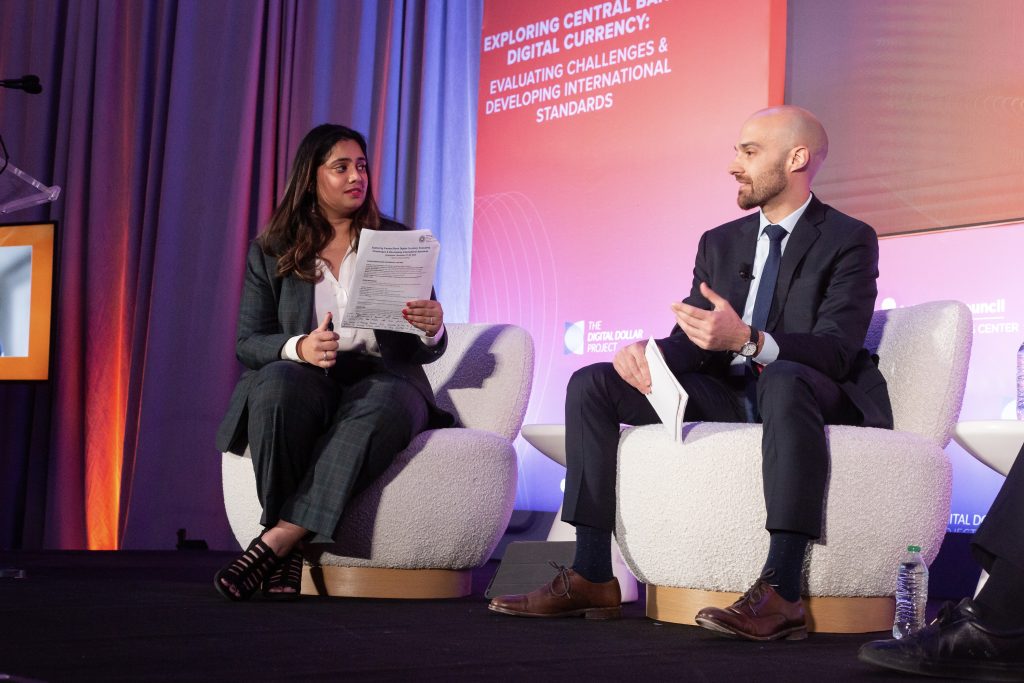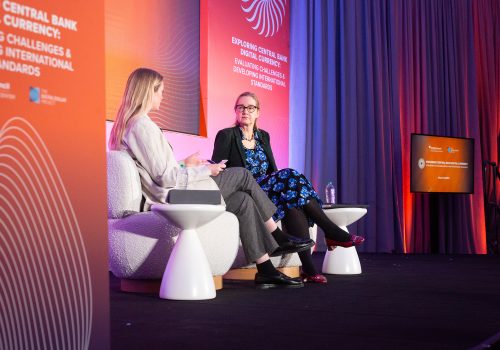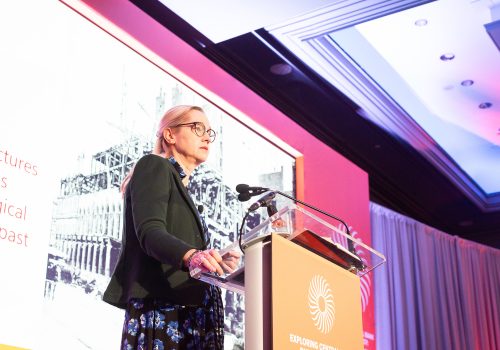Watch the full event
Over the past few years, the number of central bank digital currencies and other digital assets has grown exponentially. This growth speaks to the confidence that many people have in the interplay of technology finance and money that can offer cutting-edge transparency, speed and efficiency. But it has also resulted in new concerns, including how standards can be developed to create an even playing field for new entrants into the financial system, maintain privacy and security, and ensure that new systems are compatible with existing ones. This problem of “interoperability” needs to be solved, or else what may emerge is a world of digital asset “silos.”
The emerging and disparate marketplace of digital ledger technologies (DLTs) “is going to challenge our ability for a harmonized global solution,” explained Jennifer O’Rourke, executive director of innovation strategy at the Depository Trust and Clearing Corporation. “But the answer to that is going to be interoperability,” she added at a panel session of the Atlantic Council’s conference on central bank digital currency on November 28.
When it comes to the future of digital currencies, interoperability, which O’Rourke defined as “the sharing and the coordination of disparate data across multiple participants,” is top of mind for governments, financial institutions, and international organizations.
To examine the many technical, legal, and regulatory issues surrounding digital currency interoperability, O’Rourke was joined by Federico Grinberg, senior economist for the International Monetary Fund; Tony McLaughlin, head of emerging payments and business development at Citi; Tom Zschach, chief innovation officer at SWIFT; and Jordan Bleicher, senior advisor to the under secretary for domestic finance at the US Treasury Department.
Below are highlights from this discussion about the crucial role that interoperability will need to play in the future of digital currency, which was moderated by Ananya Kumar, an associate director of the Atlantic Council’s GeoEconomics Center.
Why is interoperability so important?
- Bleicher illustrated the importance of interoperability by outlining some of the alternatives. “One alternative would be a world of proliferating silos that can’t speak to each other. This would be a world of high transaction costs and limited gains from trade,” he said. On the other end of the spectrum, he said, is a “world of monopoly rents, limited competition, and general stagnation.” Interoperability, he said, “is a kind of middle path between these extremes.”
- Zschach spoke about how crucial interoperability is for new networks. “If you’re creating a new network and new digital asset” but have “no way to connect to what’s there already, then you’re going to build a digital island,” he said. “And you won’t drive adoption and you create even more fragmentation.”
- Grinberg warned that “if we let bridges and interlinking systems proliferate, that’s going to create a lot of inefficiencies,” as well as “create operational risks, and increase the attack surface of bridges and systems.”
Why is achieving interoperability so challenging?
- “We have to remember that DLT was created as the antithesis of regulated financial services and not in order to augment it,” said McLaughlin. “The first thing that you have to do if you want to apply DLT to the regulated spaces,” he said, is “to put a number of fundamental blockchain constructs into the garbage.”
- “The marketplace has already created distinct networks that right now are predominantly single asset networks,” said O’Rourke, “and we’ve got to figure out how we can connect those together.” She added that banks’ and market participants’ incentives cause them to find “localized solutions that are creating this fragmented marketplace.”
- “Where there are regulatory gaps or new standards that have to be developed,” said Bleicher, “we have existing institutions that we can leverage to make progress,” including the Group of Seven (G7), the Group of Twenty (G20), and the Financial Stability Board. “There’s much that needs to be done,” he said, “but we do have venues in place that we can use to advance some of this work.”
What should the approach toward interoperability look like?
- McLaughlin cautioned against allowing technology to lead the conversation on regulatory frameworks. “What really should be leading,” he said, “is a consensus about what kind of settlement venues we want to build.” Then, he said, “we can go and build something new.”
- O’Rourke emphasized the need for industry to address the outstanding problems surrounding interoperability and access standards “sooner rather than later,” because “there already are organizations and governments that are moving forward quickly,” and are “creating their own solutions without having these conversations.”
- “I think it’s very important to avoid the digital divide across countries,” said Grinberg. New technologies may be “difficult to set up from a legal regulatory standpoint” and will “require a lot of political capital to be adopted and to be aligned,” he said. “But we need to strive to make this work for the countries that are excluded or have more costly access to cross-border systems.”
Daniel Hojnacki is an assistant editor of editorial at the Atlantic Council.
Watch the full event
Further reading
Wed, Nov 29, 2023
The IMF’s multilateral, multipronged proposal to stop cross-border payments from fragmenting
New Atlanticist By Katherine Walla
“There’s really an opportunity to have a more ambitious approach to cross-border payments,” the IMF's Tobias Adrian said at an Atlantic Council event.
Tue, Nov 28, 2023
BIS Innovation Hub head Cecilia Skingsley unveils new project with the World Bank to speed up and secure development lending
Transcript By
Skingsley announced the project—led by the World Bank, International Monetary Fund, and Bank for International Settlements—at a convening on central bank digital currencies hosted by the Atlantic Council's GeoEconomics Center.
Wed, Nov 29, 2023
A newly announced blockchain-backed system could transform development lending
New Atlanticist By Katherine Walla
The new project looks to put technology to work to speed up payments and make them safer, Cecilia Skingsley said at an Atlantic Council conference.
Image: Federico Grinberg, senior economist for the International Monetary Fund speaks at an Atlantic Council convening on central bank digital currencies on November 28, 2023.




